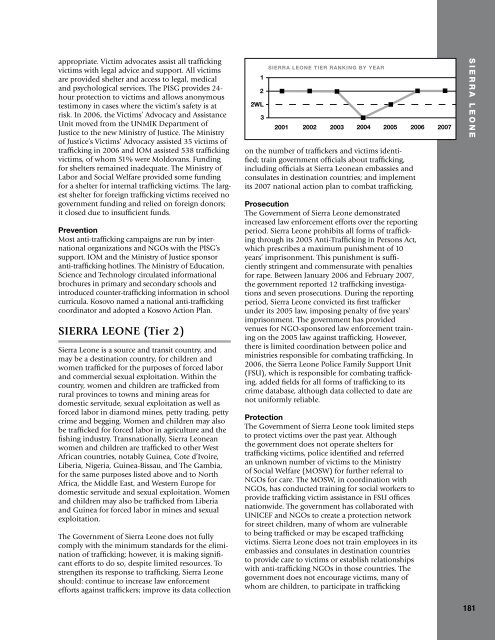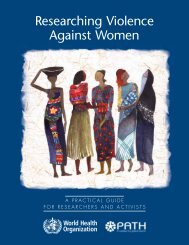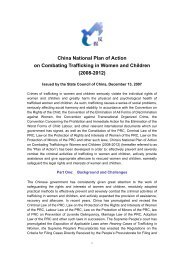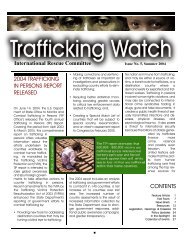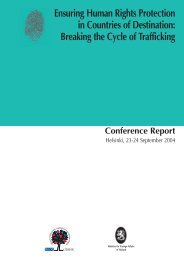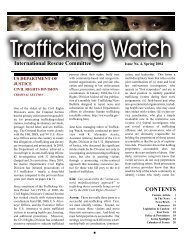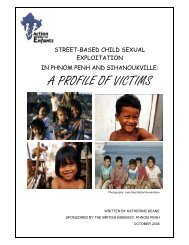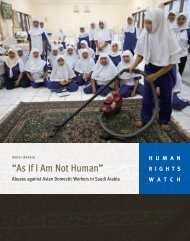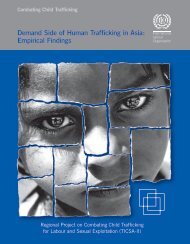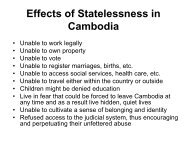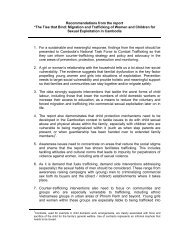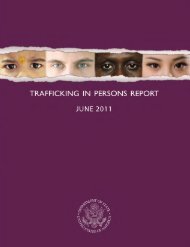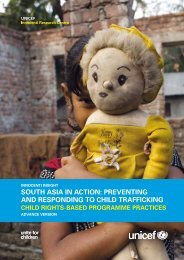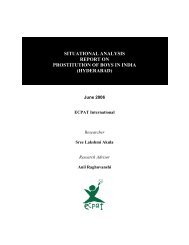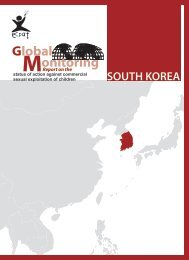2007 Trafficking in Persons Report - Center for Women Policy Studies
2007 Trafficking in Persons Report - Center for Women Policy Studies
2007 Trafficking in Persons Report - Center for Women Policy Studies
You also want an ePaper? Increase the reach of your titles
YUMPU automatically turns print PDFs into web optimized ePapers that Google loves.
appropriate. Victim advocates assist all traffick<strong>in</strong>g<br />
victims with legal advice and support. All victims<br />
are provided shelter and access to legal, medical<br />
and psychological services. The PISG provides 24-<br />
hour protection to victims and allows anonymous<br />
testimony <strong>in</strong> cases where the victim’s safety is at<br />
risk. In 2006, the Victims’ Advocacy and Assistance<br />
Unit moved from the UNMIK Department of<br />
Justice to the new M<strong>in</strong>istry of Justice. The M<strong>in</strong>istry<br />
of Justice’s Victims’ Advocacy assisted 35 victims of<br />
traffick<strong>in</strong>g <strong>in</strong> 2006 and IOM assisted 538 traffick<strong>in</strong>g<br />
victims, of whom 51% were Moldovans. Fund<strong>in</strong>g<br />
<strong>for</strong> shelters rema<strong>in</strong>ed <strong>in</strong>adequate. The M<strong>in</strong>istry of<br />
Labor and Social Welfare provided some fund<strong>in</strong>g<br />
<strong>for</strong> a shelter <strong>for</strong> <strong>in</strong>ternal traffick<strong>in</strong>g victims. The largest<br />
shelter <strong>for</strong> <strong>for</strong>eign traffick<strong>in</strong>g victims received no<br />
government fund<strong>in</strong>g and relied on <strong>for</strong>eign donors;<br />
it closed due to <strong>in</strong>sufficient funds.<br />
Prevention<br />
Most anti-traffick<strong>in</strong>g campaigns are run by <strong>in</strong>ternational<br />
organizations and NGOs with the PISG’s<br />
support. IOM and the M<strong>in</strong>istry of Justice sponsor<br />
anti-traffick<strong>in</strong>g hotl<strong>in</strong>es. The M<strong>in</strong>istry of Education,<br />
Science and Technology circulated <strong>in</strong><strong>for</strong>mational<br />
brochures <strong>in</strong> primary and secondary schools and<br />
<strong>in</strong>troduced counter-traffick<strong>in</strong>g <strong>in</strong><strong>for</strong>mation <strong>in</strong> school<br />
curricula. Kosovo named a national anti-traffick<strong>in</strong>g<br />
coord<strong>in</strong>ator and adopted a Kosovo Action Plan.<br />
SIERRA LEONE (Tier 2)<br />
Sierra Leone is a source and transit country, and<br />
may be a dest<strong>in</strong>ation country, <strong>for</strong> children and<br />
women trafficked <strong>for</strong> the purposes of <strong>for</strong>ced labor<br />
and commercial sexual exploitation. With<strong>in</strong> the<br />
country, women and children are trafficked from<br />
rural prov<strong>in</strong>ces to towns and m<strong>in</strong><strong>in</strong>g areas <strong>for</strong><br />
domestic servitude, sexual exploitation as well as<br />
<strong>for</strong>ced labor <strong>in</strong> diamond m<strong>in</strong>es, petty trad<strong>in</strong>g, petty<br />
crime and begg<strong>in</strong>g. <strong>Women</strong> and children may also<br />
be trafficked <strong>for</strong> <strong>for</strong>ced labor <strong>in</strong> agriculture and the<br />
fish<strong>in</strong>g <strong>in</strong>dustry. Transnationally, Sierra Leonean<br />
women and children are trafficked to other West<br />
African countries, notably Gu<strong>in</strong>ea, Cote d’Ivoire,<br />
Liberia, Nigeria, Gu<strong>in</strong>ea-Bissau, and The Gambia,<br />
<strong>for</strong> the same purposes listed above and to North<br />
Africa, the Middle East, and Western Europe <strong>for</strong><br />
domestic servitude and sexual exploitation. <strong>Women</strong><br />
and children may also be trafficked from Liberia<br />
and Gu<strong>in</strong>ea <strong>for</strong> <strong>for</strong>ced labor <strong>in</strong> m<strong>in</strong>es and sexual<br />
exploitation.<br />
The Government of Sierra Leone does not fully<br />
comply with the m<strong>in</strong>imum standards <strong>for</strong> the elim<strong>in</strong>ation<br />
of traffick<strong>in</strong>g; however, it is mak<strong>in</strong>g significant<br />
ef<strong>for</strong>ts to do so, despite limited resources. To<br />
strengthen its response to traffick<strong>in</strong>g, Sierra Leone<br />
should: cont<strong>in</strong>ue to <strong>in</strong>crease law en<strong>for</strong>cement<br />
ef<strong>for</strong>ts aga<strong>in</strong>st traffickers; improve its data collection<br />
on the number of traffickers and victims identified;<br />
tra<strong>in</strong> government officials about traffick<strong>in</strong>g,<br />
<strong>in</strong>clud<strong>in</strong>g officials at Sierra Leonean embassies and<br />
consulates <strong>in</strong> dest<strong>in</strong>ation countries; and implement<br />
its <strong>2007</strong> national action plan to combat traffick<strong>in</strong>g.<br />
Prosecution<br />
The Government of Sierra Leone demonstrated<br />
<strong>in</strong>creased law en<strong>for</strong>cement ef<strong>for</strong>ts over the report<strong>in</strong>g<br />
period. Sierra Leone prohibits all <strong>for</strong>ms of traffick<strong>in</strong>g<br />
through its 2005 Anti-<strong>Traffick<strong>in</strong>g</strong> <strong>in</strong> <strong>Persons</strong> Act,<br />
which prescribes a maximum punishment of 10<br />
years’ imprisonment. This punishment is sufficiently<br />
str<strong>in</strong>gent and commensurate with penalties<br />
<strong>for</strong> rape. Between January 2006 and February <strong>2007</strong>,<br />
the government reported 12 traffick<strong>in</strong>g <strong>in</strong>vestigations<br />
and seven prosecutions. Dur<strong>in</strong>g the report<strong>in</strong>g<br />
period, Sierra Leone convicted its first trafficker<br />
under its 2005 law, impos<strong>in</strong>g penalty of five years’<br />
imprisonment. The government has provided<br />
venues <strong>for</strong> NGO-sponsored law en<strong>for</strong>cement tra<strong>in</strong><strong>in</strong>g<br />
on the 2005 law aga<strong>in</strong>st traffick<strong>in</strong>g. However,<br />
there is limited coord<strong>in</strong>ation between police and<br />
m<strong>in</strong>istries responsible <strong>for</strong> combat<strong>in</strong>g traffick<strong>in</strong>g. In<br />
2006, the Sierra Leone Police Family Support Unit<br />
(FSU), which is responsible <strong>for</strong> combat<strong>in</strong>g traffick<strong>in</strong>g,<br />
added fields <strong>for</strong> all <strong>for</strong>ms of traffick<strong>in</strong>g to its<br />
crime database, although data collected to date are<br />
not uni<strong>for</strong>mly reliable.<br />
Protection<br />
The Government of Sierra Leone took limited steps<br />
to protect victims over the past year. Although<br />
the government does not operate shelters <strong>for</strong><br />
traffick<strong>in</strong>g victims, police identified and referred<br />
an unknown number of victims to the M<strong>in</strong>istry<br />
of Social Welfare (MOSW) <strong>for</strong> further referral to<br />
NGOs <strong>for</strong> care. The MOSW, <strong>in</strong> coord<strong>in</strong>ation with<br />
NGOs, has conducted tra<strong>in</strong><strong>in</strong>g <strong>for</strong> social workers to<br />
provide traffick<strong>in</strong>g victim assistance <strong>in</strong> FSU offices<br />
nationwide. The government has collaborated with<br />
UNICEF and NGOs to create a protection network<br />
<strong>for</strong> street children, many of whom are vulnerable<br />
to be<strong>in</strong>g trafficked or may be escaped traffick<strong>in</strong>g<br />
victims. Sierra Leone does not tra<strong>in</strong> employees <strong>in</strong> its<br />
embassies and consulates <strong>in</strong> dest<strong>in</strong>ation countries<br />
to provide care to victims or establish relationships<br />
with anti-traffick<strong>in</strong>g NGOs <strong>in</strong> those countries. The<br />
government does not encourage victims, many of<br />
whom are children, to participate <strong>in</strong> traffick<strong>in</strong>g<br />
S I E R R A L E O N E<br />
181


